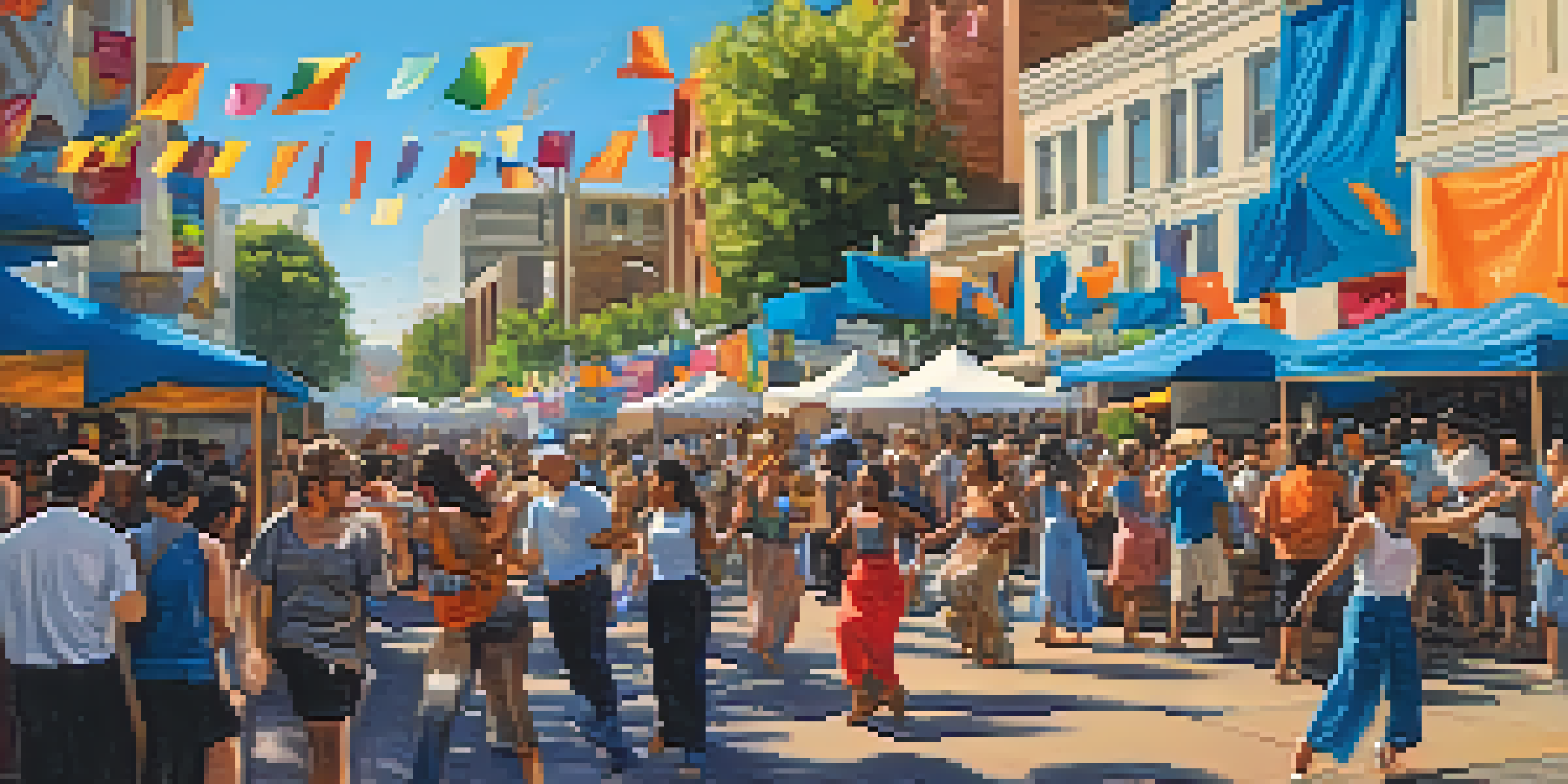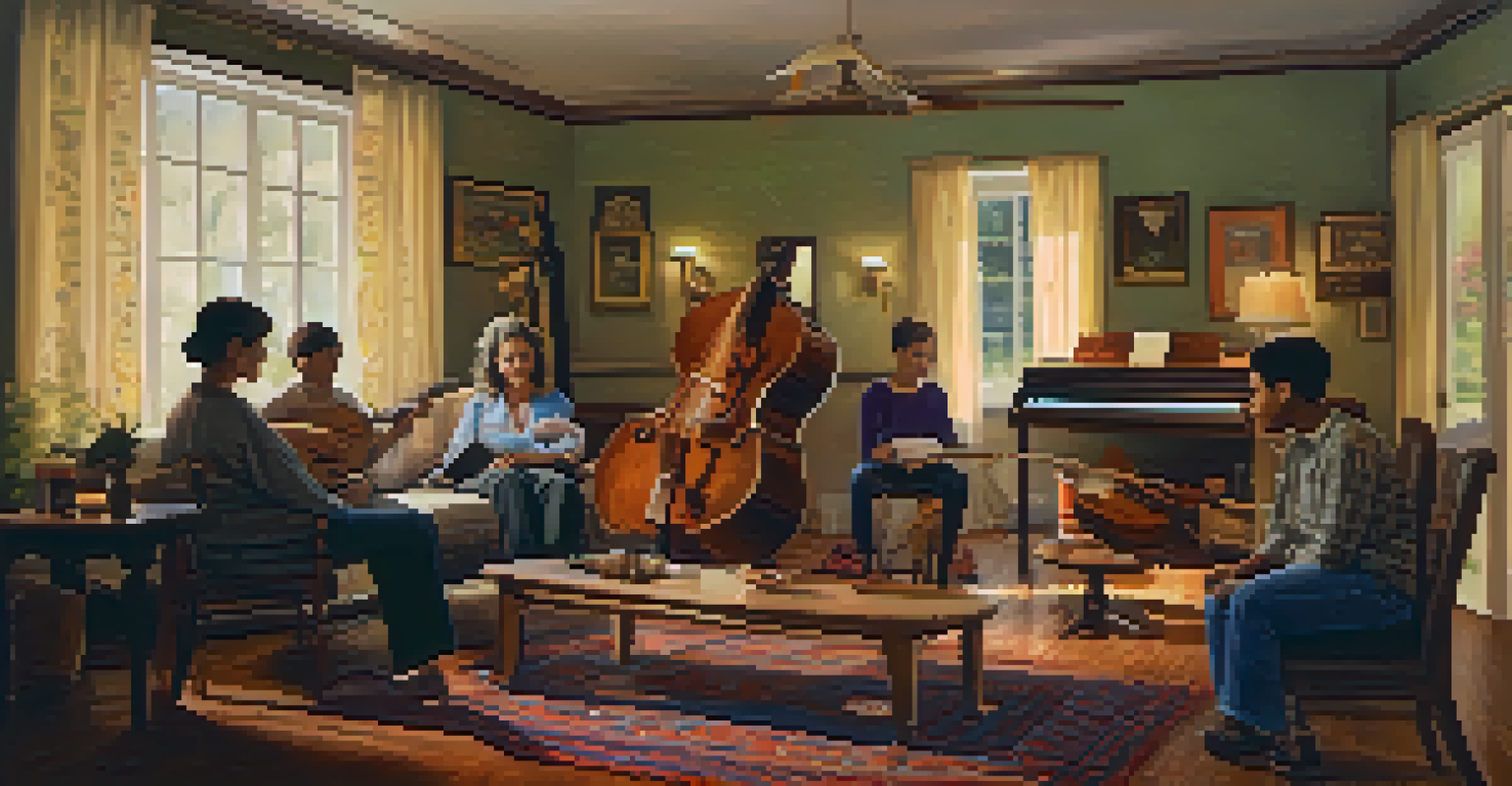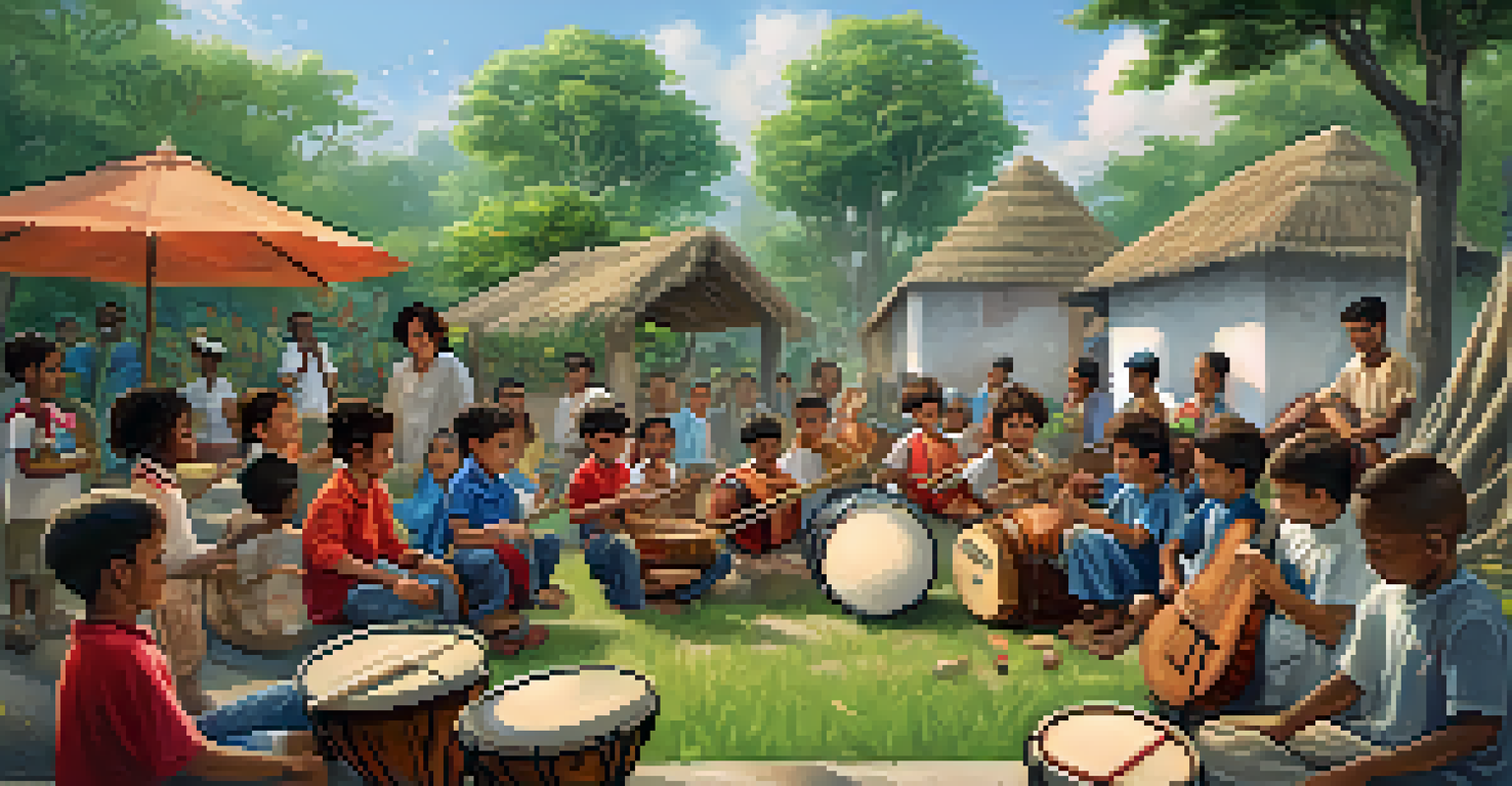The Role of Music in Celebrating Sacramento's Diverse Cultures

Music as a Universal Language in Sacramento
In a city as diverse as Sacramento, music acts as a universal language that transcends cultural barriers. From the rhythmic beats of Latin music to the soulful melodies of African American gospel, every genre tells a story of its origin and the people who created it. This shared love for music creates a sense of community where everyone can find common ground, regardless of their background.
Music is the shorthand of emotion.
For instance, events like the Sacramento Music Festival highlight local talent and invite various cultural expressions. Such celebrations showcase everything from bluegrass to hip-hop, illustrating how music can bring people together. It's in these moments that individuals from different walks of life connect, forming lasting relationships based on mutual appreciation.
Moreover, music festivals and concerts often serve as melting pots of culture, where attendees can experience different traditions through live performances. This dynamic exchange fosters understanding and respect among Sacramento's residents, reminding us that music can be a powerful tool for unity.
The Influence of Cultural Festivals on Local Music Scenes
Sacramento is home to a myriad of cultural festivals that celebrate its rich diversity, each featuring unique musical genres. Events such as the Sacramento Asian Pacific Film Festival incorporate local artists, allowing them to showcase their music alongside films that represent their culture. This blend of art forms amplifies the voices of underrepresented communities, empowering them through their craft.

These festivals not only highlight traditional music but also encourage the creation of fusion genres, where artists blend various styles to form something new. For example, a Mexican mariachi band might collaborate with a local hip-hop artist, creating a fresh sound that resonates with a wider audience. This kind of collaboration exemplifies the innovative spirit that thrives in Sacramento's music scene.
Music Unites Diverse Communities
In Sacramento, music serves as a universal language that fosters connection and appreciation among individuals from various cultural backgrounds.
Additionally, cultural festivals often include workshops, allowing attendees to learn about different musical instruments and traditions. This hands-on experience can spark a lifelong passion for music, building a richer cultural tapestry in the community as participants explore and embrace various musical styles.
Local Artists and Their Impact on Cultural Representation
Local artists in Sacramento play a crucial role in representing their cultures through music, often drawing inspiration from their heritage. By sharing their stories and experiences through songs, these musicians bring awareness to cultural issues and foster a deeper understanding among listeners. For instance, a folk artist might weave narratives about their family's journey, connecting listeners to their roots.
Without music, life would be a mistake.
Moreover, many artists use their platforms to advocate for social change, using music as a medium to address pressing community issues. This can be seen in the work of hip-hop artists who tackle topics like inequality and resilience, resonating deeply with audiences who share similar experiences. By doing so, they not only entertain but also educate and inspire listeners to take action.
Through collaborations and performances, these local artists contribute to Sacramento's ever-evolving soundscape, ensuring that diverse voices are heard. Their commitment to authenticity not only enriches the local music scene but also strengthens community bonds, laying a foundation for future generations to appreciate and celebrate their cultural heritage.
The Role of Music in Education and Community Programs
Music education plays a vital role in celebrating Sacramento's cultural diversity, providing young people with opportunities to explore various musical traditions. Schools and community centers often offer programs that teach students about different genres and instruments, fostering a sense of pride in their cultural backgrounds. These programs can be transformative, instilling confidence and a love for music in aspiring young artists.
Additionally, community initiatives such as the Sacramento Youth Symphony provide platforms for talented musicians to showcase their skills while learning about collaboration and creativity. Performances in diverse styles encourage students to appreciate the richness of various cultures, promoting inclusivity and understanding. This exposure helps cultivate a generation that values diversity and creativity.
Cultural Festivals Enhance Music Scene
Local cultural festivals provide a platform for artists to showcase their heritage, encouraging innovative collaborations and the creation of new musical genres.
Moreover, workshops and mentorship programs connect experienced musicians with youth, creating a supportive environment for artistic growth. Through these interactions, young people gain insights into the cultural significance of different musical styles, further enriching their connection to the community and its diverse heritage.
Music's Role in Bridging Generational Gaps
In many families, music serves as a bridge that connects different generations, allowing them to share cultural experiences and values. Older generations pass down traditional songs while younger members introduce contemporary styles, creating a beautiful blend of old and new. This exchange fosters appreciation for the richness of their cultural heritage while also embracing modern influences.
For example, family gatherings often feature lively music sessions where stories are shared alongside traditional dances. These moments not only strengthen familial bonds but also educate younger members about their roots. Such practices highlight the importance of music as a vessel for cultural storytelling, ensuring that traditions are preserved and celebrated.
Additionally, community events that cater to all ages encourage intergenerational participation, allowing families to experience music together. This shared enjoyment can spark conversations about cultural history and personal experiences, deepening relationships and fostering a sense of belonging within the community.
The Therapeutic Effects of Music on Cultural Identity
Music has long been recognized for its therapeutic properties, providing solace and healing to individuals from diverse backgrounds. In Sacramento, community organizations use music therapy to help people navigate their cultural identities, enabling them to express emotions and experiences through sound. This process can be particularly beneficial for those facing challenges related to integration and acceptance.
For instance, group therapy sessions often incorporate traditional music, allowing participants to reconnect with their roots while finding common ground with others. By engaging in this creative outlet, individuals can explore their identities in a supportive environment, fostering self-acceptance and community connection. Music becomes a tool for empowerment, enabling participants to share their stories and celebrate their uniqueness.
Music Empowers Future Generations
Educational programs and community initiatives in Sacramento cultivate a love for music among young people, promoting cultural pride and inclusivity.
Moreover, the collective experience of making music can be incredibly healing, as it fosters a sense of belonging among participants. When individuals come together to create, they form bonds that transcend cultural differences, building a supportive network that celebrates diversity and resilience.
The Future of Music in Sacramento's Cultural Landscape
As Sacramento continues to evolve, the future of music in the city looks promising, with an ever-growing emphasis on cultural diversity. Emerging artists are paving the way for new genres and sounds that reflect the city's multicultural essence. This evolution not only enriches the local music scene but also ensures that diverse voices are represented and celebrated.
Innovative venues and platforms are springing up, providing artists with opportunities to showcase their music and connect with audiences. From intimate coffee shops hosting open mic nights to large festivals featuring eclectic lineups, Sacramento's musical landscape is becoming increasingly vibrant and inclusive. This evolution invites collaboration and experimentation, enabling artists to explore new forms of expression.

Ultimately, the future of music in Sacramento lies in its ability to adapt and embrace change while honoring its rich cultural heritage. By fostering an environment that celebrates diversity and encourages artistic exploration, the city can continue to thrive as a hub for creative expression, ensuring that music remains a vital part of its cultural fabric.